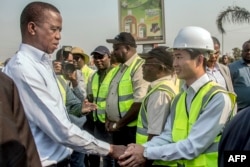A recent announcement by China that it is forgiving 23 loans for 17 African countries may be motivated by accusations of "debt-trap diplomacy," say some analysts.
Critics have long accused Beijing of practicing debt-trap diplomacy, suggesting it deliberately lends to countries that it knows cannot repay the money, thereby increasing its political leverage. China vehemently rejects this, alleging it's a way for the U.S. to discredit Beijing, Washington's main challenger in the quest for influence in Africa.
China's decision to forgive the zero-interest loans is, in part, aimed at countering the debt-trap narrative, said Harry Verhoeven, senior research scholar at Columbia University in New York.
"It is not uncommon for China to do something like this [forgive interest-free loans] … now obviously it is connected to the overall debt-trap diplomacy narrative in the sense that clearly there's a felt need on the part of China to push back," Verhoeven told VOA.
China's announcement did not specify the countries or the amount of loan forgiveness, but analysts say that since 2000, China has regularly forgiven loans that are nearing their end but have a small balance.
"This is not a loan cancellation per se, but the cancellation of the remaining unpaid portion of interest-free loans that have reached maturity, that is if a loan was supposed to be fully paid off over 20 years, but it still has an outstanding balance, they cancel that outstanding balance," Deborah Brautigam, director of the China Africa Research Initiative at Johns Hopkins University's School of Advanced International Studies, told VOA.
China's motivations
Brautigam's research shows that between 2000 and 2019, China canceled at least $3.4 billion of such debt in Africa.
While this applies to the Chinese government's interest-free loans, it is not the case with the country's interest-bearing commercial loans, which can be restructured but are never considered for cancellation, analysts explained.
Verhoeven said the sums of money involved in the 23 loans forgiven would likely be modest, but the politics of such gestures are noteworthy because "for many years the Chinese would kind of shrug at various aspects, various lines of criticism, pertaining to their engagement in different African countries." But with the debt-trap allegations, "China has belatedly woken up to the fact that this is a bit of a PR [public relations] nightmare," said Verhoeven.
China has also been playing a role in restructuring the external debt of some African countries such as Zambia, which became the first African country to default on its debt during the pandemic. China, along with France, is chairing a committee to deal with debt relief efforts. The move, welcomed by the International Monetary Fund, is ongoing.
China is Zambia's biggest creditor. Lusaka owes some $6 billion to Chinese entities. In July, Zambia's finance ministry announced it was canceling $2 billion of undisbursed loans from its external creditors, $1.6 billion of which are from Chinese banks. The move stopped construction of infrastructure projects largely funded by a Chinese bank, the South China Morning Post reported.
Shahar Hameiri, a political economist from the University of Queensland in Australia, agreed that the latest move by Beijing in forgiving African nations' interest-free loans was probably just "a goodwill gesture."
"The bigger loans are likelier to be restructured, if repayment problems loom, as we saw in Zambia," Hameiri wrote in an email to VOA.
US 'debt trap' claim
Senior officials in the U.S. have regularly warned developing countries, particularly in Africa, about the dangers of Chinese loans, and a 2020 State Department document, titled "The Elements of the China Challenge," referred to China's "predatory development program and debt-trap diplomacy."
On a visit to the continent this month, the U.S. ambassador to the United Nations, Linda Thomas-Greenfield, touched on the idea that "the wealthy and powerful have extracted Africa's natural resources for their own gain. And it continues today through bad deals and debt traps." She did not mention China by name.
Africa's view
African politicians themselves have had mixed reactions to the debt-trap theory, with some, such as Ethiopia's ambassador to China, Teshome Toga Chanaka, refuting the idea, saying, "A partnership that does not benefit both will not sustain long."
Others, including Kenya's new president-elect, William Ruto, and Angolan opposition presidential candidate Adalberto Costa Jr., have expressed concern over taking Chinese loans.
China's response
The debt trap allegations have infuriated Beijing, which says Western private lenders are responsible for the bulk of poor countries' debt and charge much higher interest rates.
The U.S. allegation against China "is simply untenable," Chinese Foreign Minister Wang Yi said this month.
Chinese state media constantly run articles aiming to debunk the narrative.
Debunking the narrative
A number of economists and researchers are also saying the debt-trap narrative against China is unfounded.
"The debt-trap idea is that Chinese banks had ulterior motives: deliberately lending to countries when they knew those countries couldn't repay," Brautigam said. "The reality is that like bondholders, which hold the majority of Africa's debt, Chinese banks lent to countries that looked quite promising. All of these creditors have belatedly realized that risk profiles can shift dramatically in a short period of time."
China restructured or refinanced about $15 billion in African debt between 2000 and 2019, Brautigam's research has found. She did not find that China had been involved in any "asset seizures."
Echoing Brautigam, Hameiri wrote in an email to VOA, "There is scant evidence that China has pursued 'debt-trap diplomacy' – i.e., the idea that it would on purpose issue loans to ensnare recipients in unsustainable debt, in order to seize strategic assets or exercise control over their governments."
Problematic loans
Chinese lending has at times been problematic, Hameiri wrote, because "in a frenzy to issue loans, Chinese lenders often spent little time considering debt sustainability. Hence, Chinese lending has contributed to debt problems in a number of countries, although it is not necessarily the only or even the primary cause as in Sri Lanka."
Some critics blamed China for the crisis in Sri Lanka earlier this year, when the cash-strapped government – which had defaulted on its debt – was deposed by mass protests. Beijing also is Colombo's biggest bilateral creditor; however, Sri Lanka's largest foreign lending source is in sovereign bonds sold in several countries.
Verhoeven said the growth in sovereign bonds has been an important factor in African nations' debt too and rejected the Chinese debt-trap narrative.
"When it comes to China, the debt-trap narrative suggests … this is being done on purpose," to get countries to vote with China in the U.N. General Assembly and to reduce Western influence, he said.
There "is little actual evidence that China's been doing this for political gain," Verhoeven said, "which is not to in any way say that Chinese lending is all fine, or that it's always responsible or the best thing for countries to do, far from it."
Since China has now been burned several times regarding its lending, with several countries defaulting on the loans, plus its own economic difficulties at home, "there's certainly a sense that the good old days of 10 or 15 years ago where [it] could sort of give out loans left and right ... are over," said Verhoeven.









